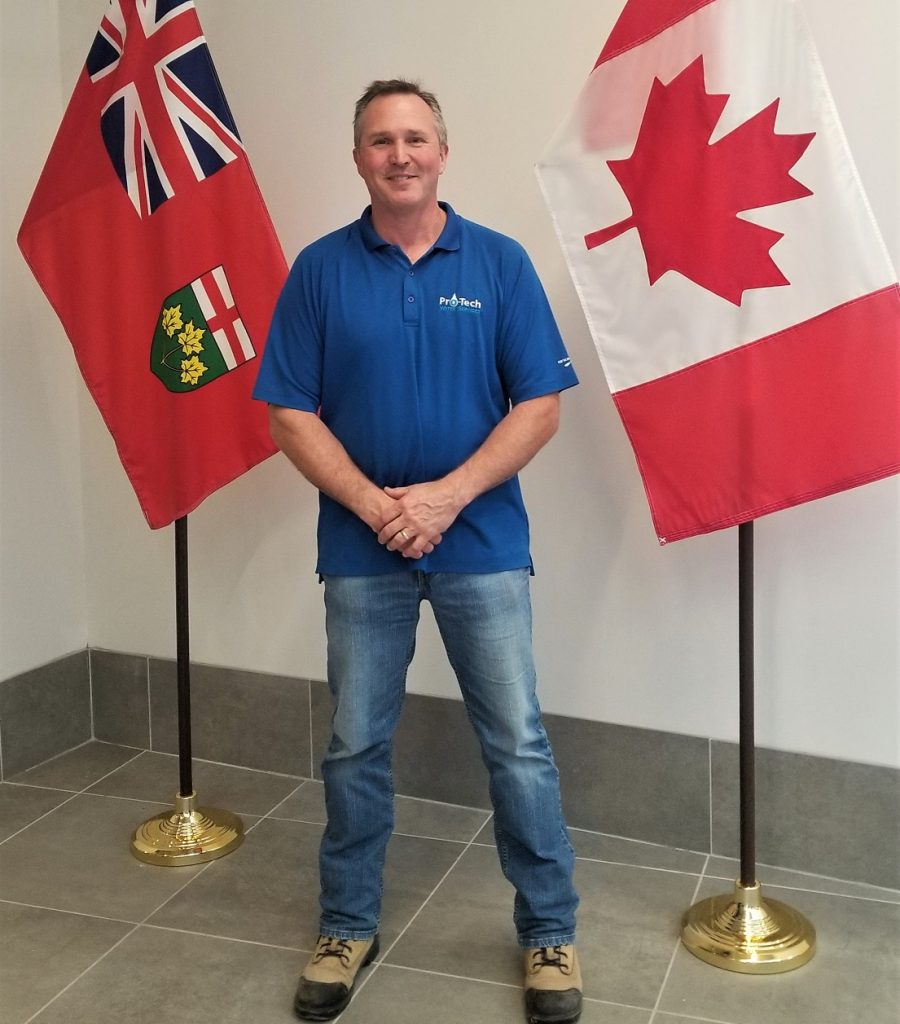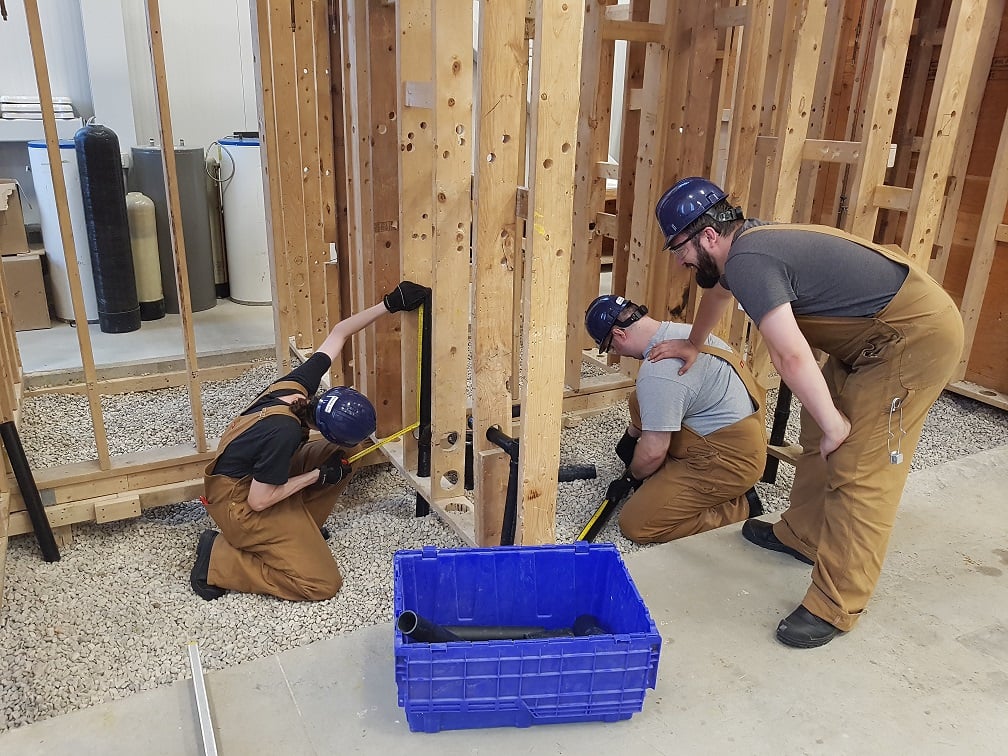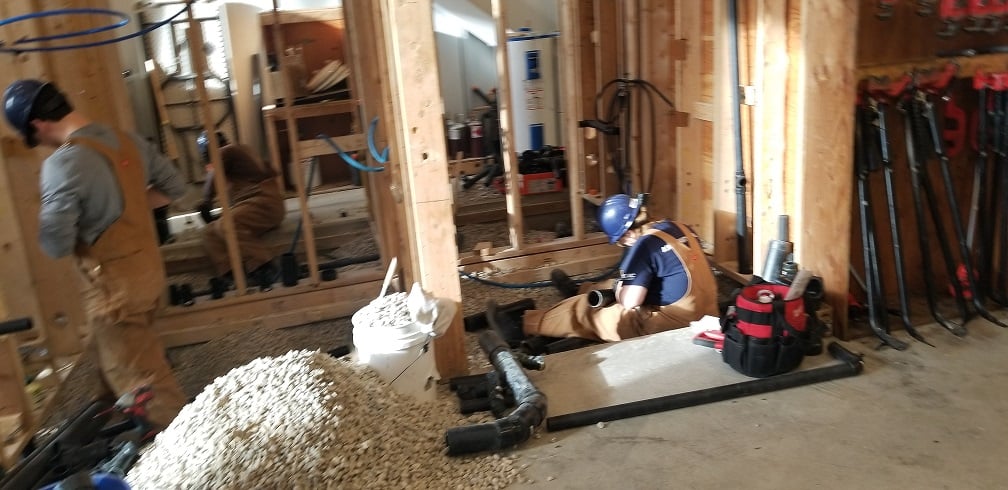Plumber instructor, Steve Dramnitzke at the Herzing College Cambridge Campus
Steve Dramnitzke is one of the most respected instructors at Herzing Trades (formerly known as the PAT Institute).
His extensive experience as a plumber, and proven abilities as a teacher, give students in his plumber program that extra “edge” after graduation.
We interviewed Steve to learn more about his background, and get an inside look at how he runs his classroom.
Find out what to expect in Steve’s class, and see if you’re a good fit for plumber training. Here’s everything you need to know, straight from the expert.
Q: Steve, can you tell us about your background as a plumber? What kind of experience do you have?
Steve: I’ve been a plumber for 27 years. I’ve worked in a lot of different areas, including water backflow and cross connection control, and medical gas.
I also managed water department customer service for the 5th largest municipality in Ontario. Over the years, I’ve gained experience in almost every sector of the industry, both as a worker and as a manager.
Q: How long have you been teaching the Pre-apprenticeship Plumber Program? What inspired you to become an instructor?
Steve: I’ve been teaching the Plumber Program for about 10 years now. The truth is, I got into teaching because I saw a great need for better trained apprentices.
Working in the industry, I saw a lot of people coming onto job sites totally unprepared for the work. They didn’t have basic plumbing knowledge or adequate safety training.
Basically, they were being asked to “fake it till they made it”, and were often afraid to ask any questions. This is no way to start a career in plumbing. It’s dangerous, and does little to build respect for the skilled trades.
Q: So, what are the most valuable skills you teach your plumbing students? What gets them hired after graduation?
Steve: My goal is to make them a useful apprentice on day one at a job site. This means that by the time students graduate, they understand all the different types of piping and materials, joining methods, codes, and how to use plumbing tools correctly.
They graduate with all the important safety certifications, such as WHMIS 2015, Working at Heights, Aerial Platforms, Scaffold Awareness, Ladder Safety, and quite a few more.
Every one of my students finishes the program with the certifications, tools, and knowledge to show up ready to work!
We treat the school exactly like a job site. Students are expected to be respectful, punctual, good team members, and hard workers.
Employers hire from us because they trust the quality and thoroughness of our plumber training. They know our students understand how a real job site works, and how to make themselves valuable assets.
Students hard at work in Steve's plumber class
Q: Can’t someone just find an apprenticeship on their own? Why should they take a program like yours?
Steve: You’re right - there’s no rule that someone has to take pre-apprenticeship training. You could approach a licensed plumber and ask them to take you on as an apprentice.
But, why would they hire you over someone who’s done the training, and already has plumber knowledge and skills? The point of pre-apprenticeship training is to help you compete better for good jobs.
If someone signs you on, straight off the street, you won’t get actual in-school training for several years into your apprenticeship. You’re a liability to the employer, and there’s a greater overall cost to them, because you don’t really know what you’re doing.
I’m an employer, and I’m much more willing to hire someone who’s done this training versus a person straight off the street.
Doing pre-apprenticeship training shows employers you are serious about the trade. You’ve already made a commitment to better yourself and learn.
They see that you’re invested in the career. You’ve spent money on tuition, you have the right tools, and you’re going to see it through. This is the true value of quality pre-apprenticeship programs.
Q: What are the toughest parts of Plumber training? Where do students tend to struggle?
Steve: Students tend to struggle in understanding the concepts and theory related to plumbing. For example, fluid dynamics and venting...these are ideas they haven’t really been exposed to or studied before.
But we start right from the basics. We progress slowly through each concept, so everyone has the chance to learn and understand.
I don’t just teach the rules, I make sure students understand why they’re doing it a certain way, and what can go wrong if they don’t follow the code.
It’s not just mindless memorization. We go deeper than that, so students truly understand what they’re doing and why it matters.
Even if you’ve never used a tool in your life, we make sure you know how to do it safely, and how to do it right.
Q: What parts of the Plumber Program do students usually enjoy the most?
Steve: They really enjoy doing the hands-on work. Students do plumbing projects and overcome challenges they never thought they'd be capable of.
For example, at the end of the program, students complete a 3-piece washroom on their own. They install a working toilet, sink, and bathtub. They run the venting and drainage, and ensure everything is done up to code. They learn every stage of that process.
It’s really rewarding for students who started training with little or no experience.
Plumber Program students in class at Herzing College, Cambridge campus
Q: Who takes your course? Can you describe the age groups and backgrounds of your students?
Steve: I have taught people from 18 to 56, from all walks of life. Every class has at least one or two women. In fact, we’re seeing more women join the plumbing class over the years.
Some students have a background in the trades, while others have never picked up a tool in their lives! We also have a fair number of newcomers to Canada….it’s a very diverse classroom.
This is a friendly, open learning environment. Everyone works together. No one is afraid to ask questions. Plus, we have only 8-10 students in each class, so it’s small enough that each person gets personal attention, and extra help when they need it.
Q: How does someone know they’d make a good plumber?
Steve: You have to want to learn, because in this field, you’re always learning. You have to like people, for sure. And you can’t be afraid to work with your hands, and at times, get dirty.
Some days, you’re super clean at the end of the day - and others, you might have to change 4 times, depending on what you’ve gotten into! You have to be open minded and ready for anything.
Q: What are some different career paths in plumbing? What options do students have?
Steve: You can go the sewer/drain cleaning path. You can deal with drinking water systems. You can go into new construction and renovation. You can install medical gas systems for hospitals, clinics, dental offices, etc.
Sales is another option, and so is becoming an instructor. You can also become a rep for plumbing wholesalers. There are so many more career options than people realize.
Q: Any last words of advice for someone who is considering becoming a plumber?
Steve: Do your research before you start. Talk to plumbers and contractors. Find out what to expect on a regular day at work, before you dive in.
Come to the campus, and talk with us about why you want to get into the trade. Sometimes I meet with students at this stage, to help them understand more of what to expect, and things to think about, before getting started.
This is the best way to make sure you’re on the right track, and that plumbing is the right trade for you.
Learn More About Pre-apprenticeship Plumber Training
Ready to take the next step, and see if plumber training is right for you?
Your next step is to speak with Admissions. An Admissions Advisor will guide you through the Plumber program, costs, financial aid, how to apply, and more.
Chat live with an Advisor now. Or click below to explore the program in more detail. We're here to help!








